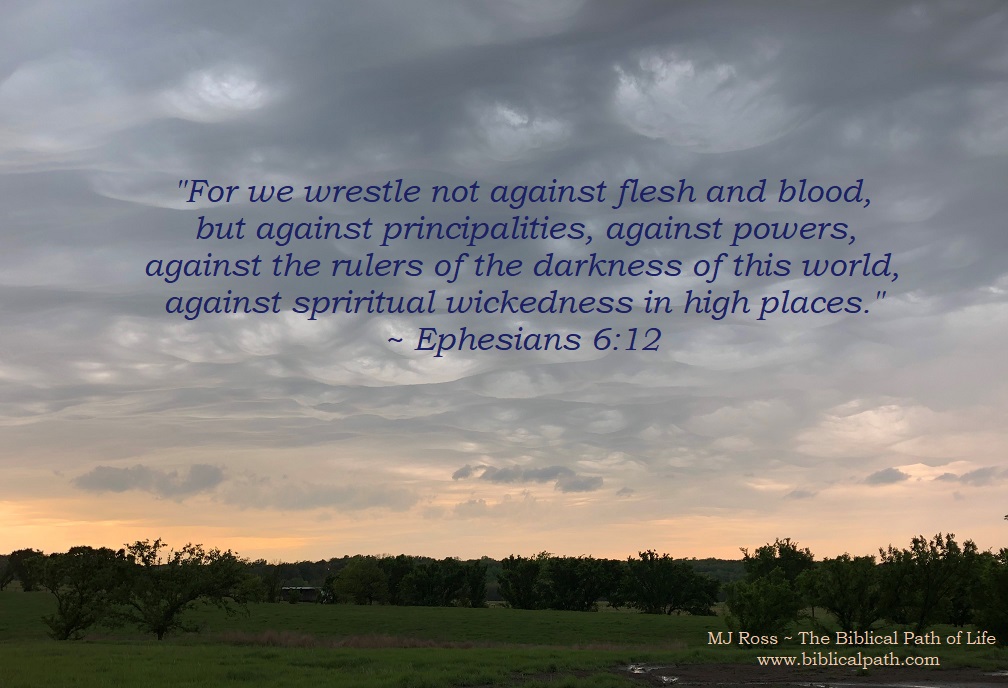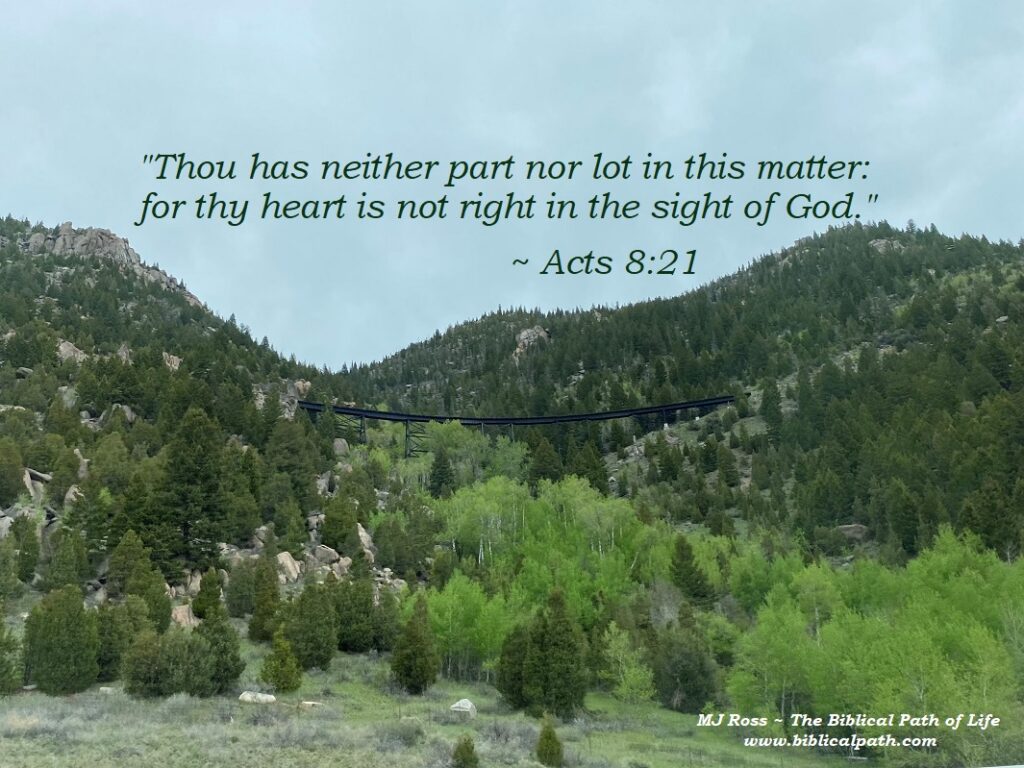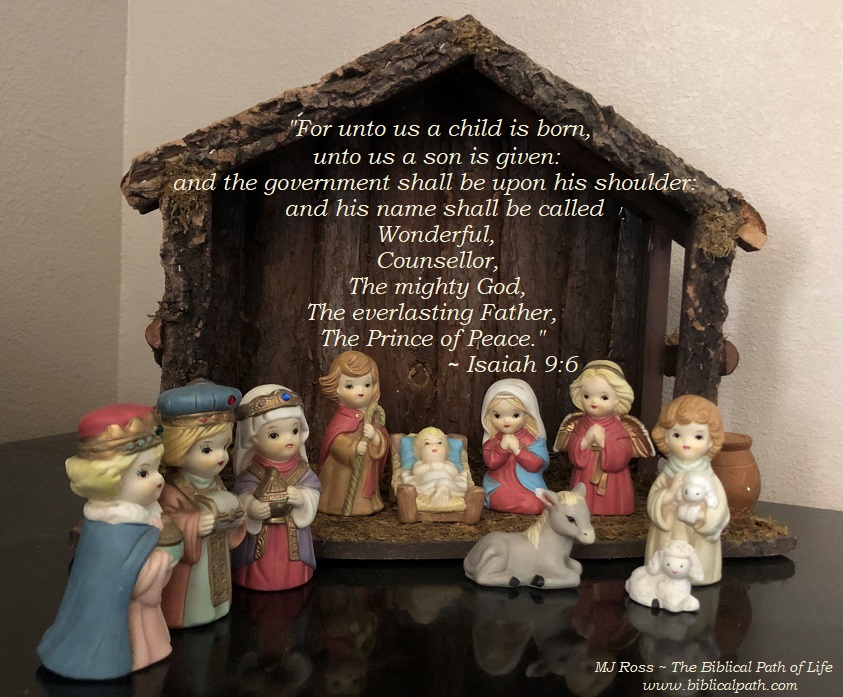
“For we wrestle not against flesh and blood, but against principalities, against powers, against the rulers of the darkness of this world, against spiritual wickedness in high places.”
Ephesians 6:12
There is a battle raging in this world. Although we see the evidence of it at times, it is mostly an unseen battle.
All Christians know the name of our enemy – Satan. Read how Jesus described him. “Ye are of your father the devil, and the lusts of your father ye will do. He was a murderer from the beginning, and abode not in the truth, because there is no truth in him. When he speaketh a lie, he speaketh of his own: for he is a liar, and the father of it” (John 8:44). He is a murder and a liar (at the very least!). We also understand Christians are to stand against “the wiles of the devil” (see Ephesians 6:11). Wiles means “the following, or pursuing of orderly, and technical procedure in the handling of a subject. Connected with evil-doing, a device, artifice, artificial method, or wile.” Satan is very strategic. We know he appears as an angel of light, he is a tempter, an accuser, and we are not to be ignorant of his devices. We need to recognize that there is spiritual good, and there is spiritual wickedness. “For we wrestle not against flesh and blood, but against principalities, against powers, against the rulers of the darkness of this world, against spiritual wickedness in high places” (Ephesians 6:12). Take note that Satan is spiritual. Just because something is spiritual does not mean it is good. The following are examples that are popular today: horoscopes, necromancy, séances, ouija board, clairvoyance, mysticism, visions, and sometimes even dreams. And this is just a short list! There is spiritual wickedness. Christians are to test every spirit. We are not to believe every spirit, for some are evil and not of God. “Beloved, believe not every spirit, but try the spirits whether they are of God: because many false prophets are gone out into the world” (1 John 4:1).
Before we are introduced in the way to be victorious in this battle, read some initial instruction: “Finally, my brethren, be strong in the Lord, and in the power of his might” (Ephesians 6:10). Warning! One without Christ is powerless to match Satan or his devices. Remember, his goal is to steal, kill, and destroy. However, when one has trusted in Christ, that enables one to be victorious. Christians must remember that Satan has been defeated. Jesus defeated him when He conquered death. Satan is no match for our God. Christians must recognize that we cannot do it on our own – for we are to be “strong in the Lord, and in the power of his might.”
Why do we need to be constantly reminded of this?
Most Christians live in defeat. This happens because most Christians are not prepared for this battle. Christians must take on the whole armor of God. If you leave out any part of this armor, you leave an area of your life vulnerable.
Each Christian needs the following: “14. Stand therefore, having your loins girt about with truth, and having on the breastplate of righteousness; 15. And your feet shod with the preparation of the gospel of peace; 16. Above all, taking the shield of faith, wherewith ye shall be able to quench all the fiery darts of the wicked. 17. And take the helmet of salvation, and the sword of the Spirit, which is the word of God: 18. Praying always with all prayer and supplication in the Spirit, and watching thereunto with all perseverance and supplication for all saints” (Ephesians 6:14-18).
- Truth: Christians must live in truth in all areas. Remember that Jesus is truth. “Jesus saith unto him, I am the way, the truth, and the life: no man cometh unto the Father, but by me” (John 14:6). Satan often attacks with lies.
- Breastplate of righteousness: this protects the vital organs, including the heart. “Keep thy heart with all diligence; for out of it are the issues of life” (Proverbs 4:23). Christians are to protect what goes into their hearts. Satan often attacks with the temptations of sin that may enter into the heart.
- Gospel of peace: Unless you have the peace of Christ’s Gospel in your heart, you cannot stand sure and fight for the truth of God’s Word. With doubts in one’s mind, one cannot combat crises of life that come. One must stand in God’s Word.
- Shield of Faith: to quench the fiery darts of the wicked. These darts most often are doubt. One must know the surety of one’s faith in Jesus. Know your Bible. (See John 5:39 and Acts 17:11.)
- Helmet of salvation: If the head is wounded, nothing else works. A Christian is to have his mind set upon God and the things of God – not the world. When one is divided in thought, having a double mind, the Bible teaches that one is unstable in all of his ways. “A double minded man is unstable in all his ways” (James 1:8). (See also Isaiah 26:3.)
- Sword of the Spirit (Word of God): “For the word of God is quick, and powerful, and sharper than any twoedged sword, piercing even to the dividing asunder of soul and spirit, and of the joints and marrow, and is a discerner of the thoughts and intents of the heart” (Hebrews 4:12). This is our only offensive weapon against Satan. Again, know your Bible.
- Prayer: Before joining the battle, Christians must be in prayer. This supplies us with all we need. Remember, we do not understand the unseen, but God’s Spirit knows all and meets our needs accordingly. We just need to remember to make our prayers heard by Him.
- To Watch: Remember what Jesus instructed: “Watch ye therefore, and pray always, that ye may be accounted worthy to escape all these things that shall come to pass, and to stand before the Son of man” (Luke 21:36).
We are able to stand from the place of victory that was won by Jesus at Calvary. He is greater than Satan, the ruler of this world (for now!). Therefore, Christians have to “stand” and be strong in the Lord and the power of His might – for Jesus already won the war. This is what guarantees our victory.
Remember what Jesus said, “He that is not with me is against me; and he that gathereth not with me scattereth abroad” (Matthew 12:30). Remember, you are not alone.
Have you chosen your side?








